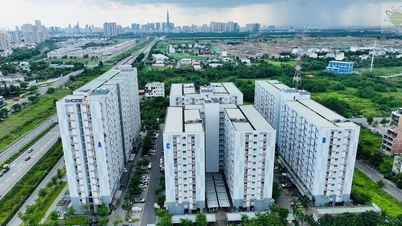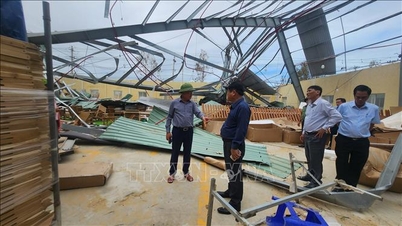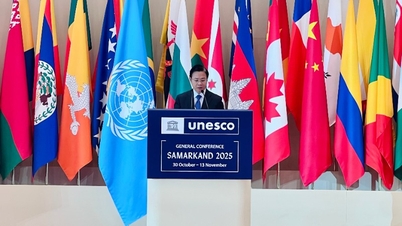The recovery of the real estate market is also the time when brokerage firms compete to recruit again. But instead of expanding wildly like the previous hot development period, businesses are focusing more on the quality of human resources to meet new regulations.
The recovery of the real estate market is also the time when brokerage firms compete to recruit again. But instead of expanding wildly like the previous hot development period, businesses are focusing more on the quality of human resources to meet new regulations.
Businesses begin to join in
From a decline to less than 1/5 of the number of active brokers in the period 2021 - 2023 compared to the number of nearly 300,000 brokers at the peak in 2019, according to a report by the Vietnam Association of Realtors (VARS), up to now, about 70% of brokerage service businesses and real estate brokers have returned to the profession.
Mr. Pham Lam, General Director of DKRA Group, assessed that this number partly reflects the positivity of the real estate market after a long period of stagnation.
“At the beginning of the year, I predicted that the real estate market would get brighter and brighter, meaning it would gradually become more prosperous. At this point, I see many important driving forces for the real estate market,” said Mr. Lam.
For the brokerage force, Mr. Lam believes that the key lies in the confidence of the market, including the confidence of investors and the brokerage team. From a future perspective, this can be considered a good sign, because brokers today need to have more knowledge and skills than the traditional approach to customers in the past.
“The decrease in quantity but increase in quality will be positive for the market. Customers put their trust in both investors and brokerage teams. When investors and real estate developers are reputable, a team of quality and skilled brokers will easily create liquidity,” Mr. Lam added.
According to Dau Tu Newspaper reporters, when the market began to recover, many large real estate brokerage companies continuously posted recruitment notices for hundreds to thousands of employees to prepare for the new "wave" of the market.
The leader of a brokerage company in Ho Chi Minh City acknowledged that his company and many other brokerage floors have started a race to hunt for good personnel with many welfare policies, fixed salaries and attractive commissions, in order to have enough resources to expand the market and market share.
Along with that, the requirements for individual brokers are also increasingly flexible and closely follow the actual needs of customers.
Change to adapt
Experts believe that the real estate brokerage profession is gradually becoming professionalized through strict legal regulations. According to lawyer Le Trong Them, CEO of LTT Law Firm, one of the important points of the Law on Real Estate Business is that in addition to the requirement of having a practice certificate, individual brokers are not allowed to operate independently.
Individuals practicing the profession are required to work in real estate brokerage service businesses or trading floors, and must undergo training and examination before being granted a practice certificate.
“The new regulations will more strictly manage businesses operating in the real estate brokerage sector,” Mr. Them said. Currently, in order to avoid having to bear the costs of salaries, insurance, taxes, etc., many floors avoid signing labor contracts with brokers or only sign seasonal collaboration contracts. This leads to many brokers lacking management and supervision, operating freely and widely, not complying with professional regulations, affecting the reputation of the industry, creating risks for customers.
In addition, Mr. Pham Lam said that some investors also require brokers to receive commissions through bank accounts and must present a practice certificate.
The brokerage profession is going through a period of transformation, so it must change to adapt. Not only facing market instability and increasingly strict legal requirements, this profession is also strongly affected by the new wave of technology, such as artificial intelligence (AI), or social networks that are completely changing the way it operates.
Mr. Huynh Thanh Hai, Deputy General Director of ERA Vietnam Company, assessed that the increase in the number of brokers is inevitable when the market develops. What needs to be focused on is having a more effective control policy to filter out qualified brokers. The law is doing this well and will be effective in the coming period.
According to Mr. Hai, the new regulations may initially put pressure on the number of active brokers, but this is a necessary natural cleansing process, helping the industry develop more sustainably. However, a roadmap and support are needed for brokers to adapt or change careers appropriately.
For now, he believes that technology like AI does not replace humans, but is only a support tool.
“Technology helps reduce workload and improve efficiency, but AI cannot yet provide skills such as consulting, building relationships and understanding customer psychology,” said Mr. Hai. At the same time, Mr. Hai acknowledged that using social networks in real estate can help build recognition quickly, but to create long-term value, it is necessary to combine with other platforms.
Source: https://baodautu.vn/batdongsan/doanh-nghiep-moi-gioi-dia-oc-tu-nang-chat-d232358.html









































































![[Infographic] Vietnam's stock market exceeds 11 million trading accounts](https://vphoto.vietnam.vn/thumb/402x226/vietnam/resource/IMAGE/2025/11/09/1762677474332_chungkhoanhomnay0-17599399693831269195438.jpeg)






















![Dong Nai OCOP transition: [Part 2] Opening new distribution channel](https://vphoto.vietnam.vn/thumb/402x226/vietnam/resource/IMAGE/2025/11/09/1762655780766_4613-anh-1_20240803100041-nongnghiep-154608.jpeg)













Comment (0)